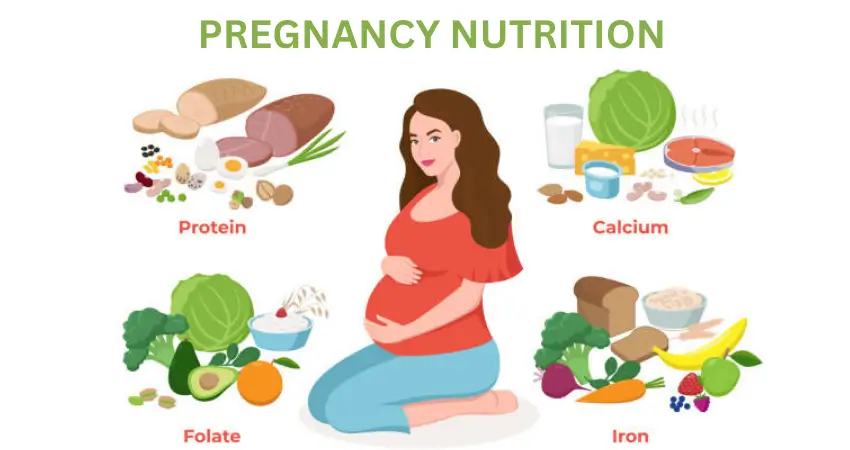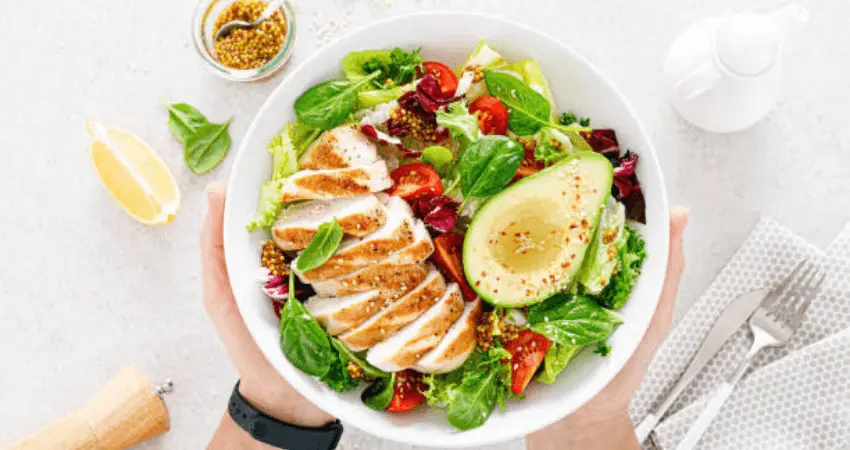- Why is Nutrition Important for Pregnant Women and New Mothers?
- What are the Essential Nutrients for Pregnant Women and New Mothers?
- How Much Should Pregnant Women and New Mothers Eat?
- How Often Should Pregnant Women and New Mothers Eat?
- What are Some Healthy Meal Ideas for Pregnant Women and New Mothers?
- Best Nutrition for Pregnant Women: Managing Weight Gain
- Conclusion on the Best Nutrition for Pregnant Women
- Frequently Asked Questions (FAQs) – Best Nutrition for Pregnant Women
Pregnancy and breastfeeding are two of the most important and challenging phases in a woman’s life. They require extra care and attention, especially when it comes to nutrition.
Eating well during pregnancy and breastfeeding can have lasting benefits for both the mother and the baby. It can help prevent complications, support healthy growth and development, and promote well-being.
But what is the best nutrition for pregnant women and new mothers? What foods should they eat more of, and what foods should they avoid? How much do they need to eat, and how often? These are some of the questions that many women have when they are expecting or nursing a baby.
In this article, we will answer these questions and provide you with some practical tips and advice on how to eat well during pregnancy and breastfeeding. We will also share some examples of nutritious meals and snacks that you can prepare at home or order from a restaurant.
We hope that this article will help you make informed choices and enjoy a healthy and happy pregnancy and breastfeeding journey
Why is Nutrition Important for Pregnant Women and New Mothers?
Nutrition is important for everyone, but it is especially important for pregnant women and new mothers. This is because they have increased nutritional needs to support their own health and that of their baby.
During pregnancy, the baby grows and develops inside the womb, relying on the mother’s blood supply for oxygen and nutrients. The mother’s body also undergoes many changes to prepare for childbirth and lactation. These changes require more energy, protein, vitamins, minerals, and fluids than usual.
During breastfeeding, the mother produces milk that provides the baby with all the nutrients he or she needs for the first six months of life. The quality and quantity of breast milk depend largely on the mother’s diet. The mother also needs to replenish her nutrient stores and maintain her health while nursing.
Eating well during pregnancy and breastfeeding can help:
- Prevent or treat common problems such as anemia, constipation, gestational diabetes, pre-eclampsia, infections, fatigue, mood swings, etc.
- Reduce the risk of birth defects, low birth weight, preterm delivery, stillbirth, etc.
- Promote optimal fetal growth and development of the brain, nervous system, bones, organs, etc.
- Support maternal recovery after delivery and prevent postpartum complications such as hemorrhage, infection, depression, etc.
- Enhance breast milk production, quality, and composition
- Protect the baby from allergies, infections, obesity, diabetes, etc.
- Strengthen the bond between the mother and the baby
What are the Essential Nutrients for Pregnant Women and New Mothers?

One of the most important aspects of the best nutrition for pregnant women and new mothers is to eat a balanced diet that includes a variety of foods from all the food groups: fruits, vegetables, grains, protein foods, dairy products, and healthy fats.
However, some nutrients are especially important for the best nutrition for pregnant women and their babies. These include
Folate: A Key Nutrient – Best Nutrition for Pregnant Women
Folate is a B vitamin that helps prevent serious problems with the developing brain and spinal cord (neural tube defects) such as spina bifida. Folate also supports cell division, DNA synthesis, blood formation, immune function, etc.
The recommended intake of folate for pregnant women is 600 micrograms (mcg) per day. The best sources of folate are dark green leafy vegetables (such as spinach), citrus fruits (such as oranges), beans (such as lentils), nuts (such as peanuts), fortified cereals (such as oatmeal), etc.
Folic acid is the synthetic form of folate that is added to supplements and fortified foods. Folic acid is more easily absorbed by the body than natural folate.
Therefore, it is recommended that all women who are planning to conceive or are already pregnant take a daily prenatal vitamin that contains 400 mcg of folic acid. This can help prevent neural tube defects even before a woman knows she is pregnant.
Iron: A Vital Mineral – Best Nutrition for Pregnant Women
Iron is a mineral that helps carry oxygen in the blood to all parts of the body. Iron also supports immune function, brain development, etc.
Pregnant women need more iron than usual because their blood volume increases by about 50% during pregnancy. They also need to provide iron for their growing baby and placenta. Iron deficiency can cause anemia (low red blood cell count), which can increase the risk of preterm delivery, low birth weight, infections, etc.
The recommended intake of iron for pregnant women is 27 milligrams (mg) per day. The best sources of iron are animal foods (such as meat, poultry, fish, and eggs), fortified cereals (such as oatmeal), beans (such as lentils), nuts (such as almonds), dried fruits (such as raisins), etc.
However, not all iron is absorbed equally by the body. There are two types of iron: heme and non-heme. Heme iron is found only in animal foods and is more easily absorbed than non-heme iron, which is found in both animal and plant foods.
To enhance the absorption of non-heme iron, it is advisable to consume it with foods that contain vitamin C (such as citrus fruits, tomatoes, peppers, etc.) or heme iron (such as meat, poultry, fish, etc.).
In addition to eating iron-rich foods, pregnant women may need to take an iron supplement if they are diagnosed with anemia or are at risk of developing it. This can be determined by a blood test and a consultation with a health care provider.
The usual dose of iron supplement for pregnant women is 30 to 60 mg per day. However, some women may experience side effects such as constipation, nausea, vomiting, etc. To minimize these effects, it is recommended to take the supplement with food, drink plenty of fluids
Calcium: A Crucial Mineral – Best Nutrition for Pregnant Women
Calcium is a mineral that helps build and maintain strong bones and teeth. Calcium also supports muscle contraction, nerve transmission, blood clotting, hormone secretion, etc.
Pregnant women need adequate calcium to prevent bone loss and to provide calcium for their baby’s bones and teeth. Calcium deficiency can increase the risk of pre-eclampsia (high blood pressure and protein in the urine), which can lead to serious complications for both the mother and the baby.
The recommended intake of calcium for pregnant women is 1,000 mg per day. The best sources of calcium are dairy products (such as milk, yogurt, and cheese), fortified plant milks (such as soy milk, and almond milk), fortified cereals (such as oatmeal), green leafy vegetables (such as kale), nuts (such as almonds), seeds (such as sesame), etc.
However, not all calcium is absorbed equally by the body. There are factors that can enhance or inhibit the absorption of calcium. Some of these factors are:
- Vitamin D: Vitamin D helps the body absorb calcium from food and supplements. The main source of vitamin D is sunlight exposure on the skin. However, many people do not get enough vitamin D from sunlight alone, especially in winter or in areas with high pollution or cloud cover. Therefore, it is recommended that pregnant women take a daily prenatal vitamin that contains 600 international units (IU) of vitamin D. Other sources of vitamin D are fatty fish (such as salmon), egg yolks, liver, fortified milk, and cereals.
- Phytic acid: Phytic acid is a compound found in some plant foods (such as whole grains, beans, and nuts) that can bind to calcium and reduce its absorption. To minimize this effect, it is advisable to soak or sprout these foods before cooking or eating them. Alternatively, they can be consumed with foods that contain vitamin C or heme iron.
- Oxalic acid: Oxalic acid is another compound found in some plant foods (such as spinach) that can bind to calcium and reduce its absorption. However, this effect is not significant if these foods are consumed in moderation and with other calcium-rich foods.
- Sodium: Sodium is a mineral that helps regulate fluid balance and blood pressure in the body. However, too much sodium can increase the excretion of calcium in the urine and reduce its availability for the bones. Therefore, it is advisable to limit the intake of salt and processed foods that contain high amounts of sodium.
Zinc: An Important Mineral – Best Nutrition for Pregnant Women
Zinc is a mineral that helps support immune function, wound healing, cell growth, DNA synthesis, etc.
Pregnant women need more zinc than usual because they need to provide zinc for their baby’s growth and development. Zinc deficiency can increase the risk of infections, preterm delivery, low birth weight, etc.
The recommended intake of zinc for pregnant women is 11 mg per day. The best sources of zinc are animal foods (such as meat, poultry, fish, and eggs), fortified cereals (such as oatmeal), beans (such as lentils), nuts (such as cashews), seeds (such as pumpkin seeds), etc.
Iodine: A Necessary Mineral – Best Nutrition for Pregnant Women
Iodine is a mineral that helps produce thyroid hormones, which regulate metabolism, growth, and development. Iodine is especially important for the development of the baby’s brain and nervous system.
Pregnant women need more iodine than usual because they need to provide iodine for their baby’s thyroid function. Iodine deficiency can cause goiter (enlarged thyroid gland), cretinism (severe mental and physical retardation), miscarriage, stillbirth, etc.
The recommended intake of iodine for pregnant women is 220 mcg per day. The best sources of iodine are seafood (such as fish, shellfish, and seaweed), dairy products (such as milk, yogurt, and cheese), iodized salt, fortified bread, and cereals, etc.
However, too much iodine can also be harmful and cause thyroid problems. Therefore, it is advisable to avoid excessive intake of iodine supplements or foods that contain high amounts of iodine (such as kelp, dulse, etc.).
Omega-3 Fatty Acids: A Beneficial Fat – Best Nutrition for Pregnant Women
Omega-3 fatty acids are a type of polyunsaturated fat that have anti-inflammatory and anti-clotting properties. Omega-3 fatty acids also play a vital role in the development of the baby’s brain, eyes, and nervous system.
Pregnant women need adequate omega-3 fatty acids to support their own health and that of their baby. Omega-3 fatty acids can help prevent preterm delivery, low birth weight, postpartum depression, etc.
The recommended intake of omega-3 fatty acids for pregnant women is 200 mg per day of docosahexaenoic acid (DHA), which is one of the main types of omega-3 fatty acids. The best sources of omega-3 fatty acids are fatty fish (such as salmon, tuna, sardines, and mackerel), fish oil supplements, flaxseeds, chia seeds, walnuts, etc.
However, some fish may contain high levels of mercury, which can be harmful to the baby’s brain and nervous system. Therefore, it is advisable to limit the intake of fish that are high in mercury (such as shark, swordfish, king mackerel
Vitamin A: A Valuable Vitamin – Best Nutrition for Pregnant Women
Vitamin A is a fat-soluble vitamin that helps maintain healthy skin, eyesight, immune function, etc. Vitamin A also supports the growth and differentiation of cells and tissues in the body.
Pregnant women need adequate vitamin A to prevent infections and support their baby’s development. Vitamin A deficiency can cause night blindness, increased susceptibility to infections, increased risk of maternal mortality, etc.
The recommended intake of vitamin A for pregnant women is 770 mcg per day. The best sources of vitamin A are animal foods (such as liver, eggs, cheese), orange and yellow fruits and vegetables (such as carrots, sweet potatoes, mangoes), dark green leafy vegetables (such as spinach), fortified milk and cereals, etc.
However, too much vitamin A can also be harmful and cause birth defects in the baby. Therefore, it is advisable to avoid excessive intake of vitamin A supplements or foods that contain high amounts of vitamin A (such as liver).
How Much Should Pregnant Women and New Mothers Eat?

The best nutrition for pregnant women and new mothers requires eating the right amount of food for their age, weight, height, activity level, stage of pregnancy, or breastfeeding. However, some general guidelines are:
- During pregnancy: Pregnant women need about 300 extra calories per day in the second and third trimesters compared to their pre-pregnancy needs. This means eating about one or two extra snacks per day. However, this does not mean eating for two or indulging in unhealthy foods. The quality of calories is more important than the quantity. Pregnant women should choose nutrient-dense foods that provide them with essential nutrients for themselves and their babies
- During breastfeeding: Breastfeeding women need about 500 extra calories per day compared to their pre-pregnancy needs. This means eating about two or three extra snacks per day. However, this does not mean eating whatever they want or neglecting their nutrition. Breastfeeding women should also choose nutrient-dense foods that provide them with essential nutrients for themselves and their babies. Breastfeeding can also help burn some calories and lose some of the weight gained during pregnancy.
The following table shows some examples of healthy snacks that provide about 200 to 300 calories each: Open in browser
| Snack | Calories |
|---|---|
| A cup of low-fat yogurt with a sliced banana and a handful of granola | 300 |
| A whole-wheat pita bread with hummus and sliced cucumber | 250 |
| A hard-boiled egg with a slice of whole-wheat toast and a glass of orange juice | 280 |
| A handful of mixed nuts with a piece of dark chocolate and a glass of milk | 320 |
| A smoothie made with milk, berries, spinach, and flaxseeds | 260 |
How Often Should Pregnant Women and New Mothers Eat?
The best nutrition for pregnant women and new mothers also depends on the frequency of eating. Eating too much or too little at one time can cause problems such as nausea, indigestion, bloating, hunger, etc.
Therefore, it is advisable to eat small and frequent meals throughout the day, rather than large and infrequent ones. This can help maintain a steady blood sugar level, prevent overeating or undereating, and provide a constant supply of nutrients for both the mother and the baby.
Some general guidelines are:
- During pregnancy: Pregnant women should eat about three main meals and two to three snacks per day. They should also drink plenty of fluids, especially water, to stay hydrated and prevent constipation. They should avoid skipping meals or fasting, as this can affect their blood sugar levels and their baby’s growth. They should also avoid eating too close to bedtime, as this can cause heartburn or reflux.
- During breastfeeding: Breastfeeding women should eat about three main meals and three to four snacks per day. They should also drink plenty of fluids, especially water, to stay hydrated and support milk production. They should avoid skipping meals or fasting, as this can affect their milk supply and quality. They should also avoid eating foods that may cause allergic reactions or discomfort in their baby, such as spicy foods, caffeine, alcohol, etc.
What are Some Healthy Meal Ideas for Pregnant Women and New Mothers?

The best nutrition for pregnant women and new mothers can be achieved by eating well during pregnancy and breastfeeding. This does not have to be complicated or boring.
There are many delicious and nutritious meals that can be prepared at home or ordered from a restaurant. These meals can provide the best nutrition for pregnant women and their babies. Here are some examples of healthy meal ideas for pregnant women and new mothers:
- Breakfast: Oatmeal with fresh or dried fruits, nuts, and milk; scrambled eggs with cheese and whole-wheat toast; whole-grain cereal with milk and berries; pancakes with yogurt and honey; etc.
- Lunch: Chicken salad sandwich with whole-wheat bread, lettuce, tomato, and mayonnaise; vegetable soup with whole-wheat crackers and cheese; tuna salad with whole-wheat pita bread, lettuce, tomato, and yogurt dressing; grilled cheese sandwich with tomato soup; etc.
- Dinner: Salmon with roasted potatoes and broccoli; chicken curry with brown rice and green beans; beef stew with whole-wheat bread and salad; pasta with tomato sauce and cheese; etc.
These are just some examples of healthy meal ideas that you can blog about. You can also create your own recipes or modify existing ones to suit your tastes and preferences.
Best Nutrition for Pregnant Women: Managing Weight Gain
When it comes to ensuring the best nutrition for pregnant women, understanding how much weight should be gained during pregnancy is a vital aspect of maternal health.
In this section, we will delve into the guidelines for healthy weight gain and the importance of balanced nutrition for expectant mothers
How Much Weight Should a Woman Gain During Pregnancy?

When it comes to ensuring the best nutrition for pregnant women, understanding how much weight should be gained during pregnancy is a vital aspect of maternal health.
In this section, we will delve into the guidelines for healthy weight gain and the importance of balanced nutrition for expectant mothers.
Healthy Weight Gain Guidelines
The best nutrition for pregnant women begins with proper weight management. The recommended weight gain during pregnancy varies depending on a woman’s pre-pregnancy body mass index (BMI). Here are the general guidelines:
Underweight (BMI less than 18.5): Best nutrition practices for underweight expectant mothers involve aiming to gain between 28 to 40 pounds during their pregnancy. This range ensures that both the mother and the baby receive the essential nutrients they need.
Normal weight (BMI between 18.5 and 24.9): Achieving the best nutrition for pregnant women with a normal BMI involves targeting a weight gain of approximately 25 to 35 pounds throughout pregnancy. This range is optimal for maternal and fetal health.
Overweight (BMI between 25 and 29.9): For those with a BMI in the overweight range, it is recommended to gain around 15 to 25 pounds during pregnancy. Emphasizing nutrient-dense foods is essential to meet the best nutrition standards.
Obese (BMI of 30 or higher): Pregnant women classified as obese should aim for a weight gain of 11 to 20 pounds during pregnancy. Prioritizing a well-balanced diet is crucial for both mother and baby’s well-being.
Tracking Your Progress
To ensure you’re on the right path towards the best nutrition for pregnant women, it’s essential to consult with your healthcare provider regularly. They can monitor your weight gain and overall health throughout your pregnancy journey. Additionally, keeping a food diary and tracking your daily intake of essential nutrients can help you make informed dietary choices.
Best Nutrition for Pregnant Women: A Nutrient-Rich Journey

In conclusion, achieving the best nutrition for pregnant women involves understanding and managing weight gain appropriately.
By following the guidelines based on your pre-pregnancy BMI, focusing on nutrient-rich foods, and consulting with your healthcare provider, you can promote a healthy and successful pregnancy.
Table: Recommended Weight Gain During Pregnancy
| Pre-pregnancy BMI | Recommended Weight Gain Range |
|---|---|
| Underweight (<18.5) | 28-40 pounds |
| Normal weight (18.5-24.9) | 25-35 pounds |
| Overweight (25-29.9) | 15-25 pounds |
| Obese (≥30) | 11-20 pounds |
However, these are only general guidelines and may vary depending on your individual situation and health status. Therefore, it is advisable to consult with your healthcare provider about your optimal weight gain during pregnancy.
Conclusion on the Best Nutrition for Pregnant Women
Nutrition is one of the most important aspects of pregnancy and breastfeeding. Eating well during these phases can have lasting benefits for both the mother and the baby. It can help prevent complications, support healthy growth and development, and promote well-being.
However, eating well does not mean eating more or less than usual. It means eating a balanced diet that includes a variety of foods from all the food groups. It also means paying attention to the quality and quantity of calories, as well as the frequency of eating.
Some nutrients are particularly important during pregnancy and breastfeeding. These include folate, iron, calcium, zinc, iodine, omega-3 fatty acids, vitamin A, etc. These nutrients can be obtained from food sources or supplements as recommended by a health care provider.
Eating well during pregnancy and breastfeeding can be easy and enjoyable. There are many healthy meal ideas that can be prepared at home or ordered from a restaurant. The key is to choose nutrient-dense foods that provide essential nutrients for both the mother and the baby.
We hope that this article has helped you understand the best nutrition for pregnant women and new mothers. We also hope that it has inspired you to eat well during these special phases of your life.
Frequently Asked Questions (FAQs) – Best Nutrition for Pregnant Women
Here are some frequently asked questions (FAQ) about the best nutrition for pregnant women and new mothers:
Q: What is the importance of nutrition during pregnancy?
A: Nutrition during pregnancy is of paramount importance as it directly impacts the health and development of both the mother and the baby. Proper nutrition provides essential nutrients that support the baby’s growth, prevent birth defects, and ensure the well-being of the expectant mother.
Q: How can I achieve the best nutrition for pregnant women?
A: To achieve the best nutrition during pregnancy, focus on a well-balanced diet that includes a variety of nutrient-rich foods. This should include a mix of fruits, vegetables, lean proteins, whole grains, and dairy products or dairy alternatives. Consulting with a healthcare provider or a registered dietitian can also provide personalized guidance.
Q: Are there specific foods that pregnant women should avoid?
A: Yes, there are certain foods that pregnant women should avoid or consume in moderation. These include raw seafood, undercooked meat and eggs, unpasteurized dairy products, and foods high in mercury, such as certain types of fish. Additionally, it’s advisable to limit caffeine and alcohol intake during pregnancy.
Q: Can I drink coffee or tea during pregnancy and breastfeeding?
A: Coffee and tea are both sources of caffeine, which is a stimulant that can affect the nervous system, heart rate, blood pressure, etc. Caffeine can also cross the placenta and reach the baby’s bloodstream, as well as pass into the breast milk and affect the baby’s sleep and behavior.
Therefore, it is advisable to limit the intake of caffeine during pregnancy and breastfeeding. The recommended limit is no more than 200 mg of caffeine per day, which is equivalent to about two cups of coffee or four cups of tea. However, some people may be more sensitive to caffeine than others and may experience adverse effects even with lower amounts.
It is also important to note that caffeine is not only found in coffee and tea but also in other beverages and foods such as energy drinks, soft drinks, chocolate, etc. Therefore, it is advisable to check the labels of these products and avoid consuming too much caffeine from different sources.
Q: Can I continue to exercise during pregnancy?
A: Yes, most women can continue to exercise during pregnancy. In fact, regular, moderate-intensity exercise can have numerous benefits for expectant mothers. However, it’s crucial to consult with your healthcare provider before starting or continuing any exercise program during pregnancy.
Q: How can I manage morning sickness and food aversions?
A: Morning sickness and food aversions are common during pregnancy. To manage them, try eating smaller, more frequent meals, staying hydrated, and avoiding strong-smelling or greasy foods. Ginger and acupressure bands can also help alleviate nausea for some women.
Q: Is it safe to follow a vegetarian or vegan diet during pregnancy?
A: Yes, it is possible to follow a vegetarian or vegan diet during pregnancy, but careful planning is necessary to ensure you get all the essential nutrients. Focus on plant-based sources of protein, iron, calcium, and vitamin B12. Consulting with a dietitian who specializes in prenatal nutrition can be beneficial.




